
A meme doing the rounds on Twitter shows a road sign, apparently repainted by Ukrainians to confuse invading Russian soldiers, with all directions pointed towards: ‘Гаага’ (The Hague). Whether real or photoshopped, the point is cleverly made. But when it comes to prosecuting alleged war crimes and crimes against humanity (CAH) in Ukraine should all roads really lead to The Hague?
Russia’s invasion of Ukraine, which began on 24 February 2022, is very much a war of the 21st century. Videos and images of alleged atrocities (e.g., attacks on (apparently) civilian objects such as maternity hospital and a theatre sheltering children marked ‘Дети’ (children) in Mariupol) have been posted to social media platforms in vast numbers in almost real-time. At a similarly break-neck speed, the international law community has debated forums for prosecuting international criminal law (ICL) violations including: an Ad-hoc or Special Tribunal for the crime of aggression, the International Criminal Court (ICC) and universal jurisdiction (e.g., here, here, and here). Remarkably little attention, however, has been given to Ukraine’s capacity to prosecute atrocities, namely war crimes and CAH, committed on its territory before its own courts.
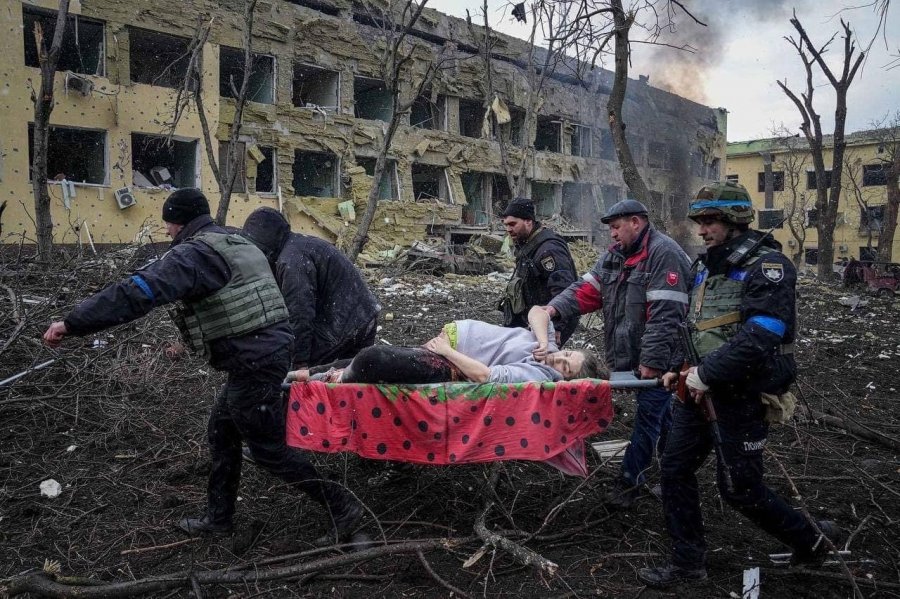
At the time of writing, the Ukraine conflict’s outcome is highly uncertain. Negotiations between Ukrainian and Russian representatives are ongoing, with some reports that an agreement is within reach. Russia’s invasion is on the backfootmaking a stalemate possible. It thus remains feasible that the Ukrainian government will retain, or even regain, effective control over substantial swathes of territory and/or that conflict may become ‘frozen’ in the medium to long-term. As such, this blogpost considers the possibilities for prosecuting atrocities committed in Ukraine in its own courts under the Ukrainian Criminal Code (UCC).
The Ukraine Conflict
Russia’s invasion of Ukraine is a dramatic escalation in hostilities between the two countries, both in terms of the geography and brutality of violence. All major cities in Ukraine have been attacked. Less than a month after the start of the invasion the official (conservative) death toll stands at over 900 (this is likely a major underestimate as it is currently impossible to count the dead in some places – in Mariupol, for example, the dead are left out in the street and buried in mass graves). The conflict in Ukraine is not new, however. According to the assessment made by the ICC’s Office of the Prosecutor (OTP) during its preliminary examination (concluded 11 December 2020) there has been an international armed conflict between Ukraine and Russia since 26 February 2014 in Crimea and since 14 July 2014 in the Donbas (paras 260 and 266). A parallel non-international armed conflict between Ukrainian government forces and ‘separatist’ forces in the Donbas has been underway since 30 April 2014 (para 266). Moreover, the OTP recorded in excess of 1,200 crimes including: wilful killing/murder; torture and inhuman/cruel treatment; outrages on personal dignity; and rape and other forms of sexual violence (para 278-9). Prior to 24 February 2022, around 14,000 people (mostly Ukrainians) were killed and 1.5 million internally displaced by the war.
Capacity
The outbreak of conflict in 2014 revealed Ukraine to be ill-equipped to prosecute atrocities committed on its territory in its courts. Criminal investigators did not know how to systematically gather and structure evidence for war crimes cases. Article 438 of the UCC on ‘violations of the rules of warfare’ proved challenging for Ukrainian prosecutors. A brief catch-all provision, Article 438’s operationalisation turns largely on the phrase: ‘any other violations of rules of warfare recognised by international instruments consented to by the Verkhovna Rada [Ukraine’s parliament]’ (emphasis added). As noted by Ukraine’s former Deputy Prosecutor, Gyunduz Mamedov, in essence this means: ‘for an effective investigation of this category of crimes, it is necessary to know these international documents, and there are about 30 of them’ (among them are the Geneva Conventions and Additional Protocol I and II). Consequently, Ukrainian prosecutors, who lacked expertise in international humanitarian law (IHL) and ICL, instead charged crimes committed in connection to the conflict as more familiar ‘normal’ offences – e.g., murder or membership of a terrorist organisation.
In recent years, however, Ukraine has made substantial progress in its capacity to prosecute war crimes. In October 2019, Ukraine established a dedicated War Crimes Unit (The Department of the Office of the Prosecutor General for the Investigation of Crimes Committed in the Conflict) at the initiative of then-Deputy Prosecutor Mamedov, who had built-up experience prosecuting conflict-related cases as the Prosecutor of Autonomous Crimea and on MH17 with the Dutch-led Joint Investigation Team (see also here). Under Mamedov’s leadership, the Unit centralised cases linked to the conflict (which were previously investigated individually by regional departments), set up cooperation networks with human rights groups documenting ICL violations and, with international assistance, trained Ukrainian jurists and investigators (see here, here and here). Importantly, the new Unit also worked to reclassify conflict-related cases under Article 438. As war crimes (and CAH) are exempt from statute of limitations and amnesties under customary international law (CIL) this shored up the viability of future prosecutions. To date, the Unit has secured three convictions for war crimes (two in absentia and one in propria persona) and opened another 21 cases against 41 people under Article 438.
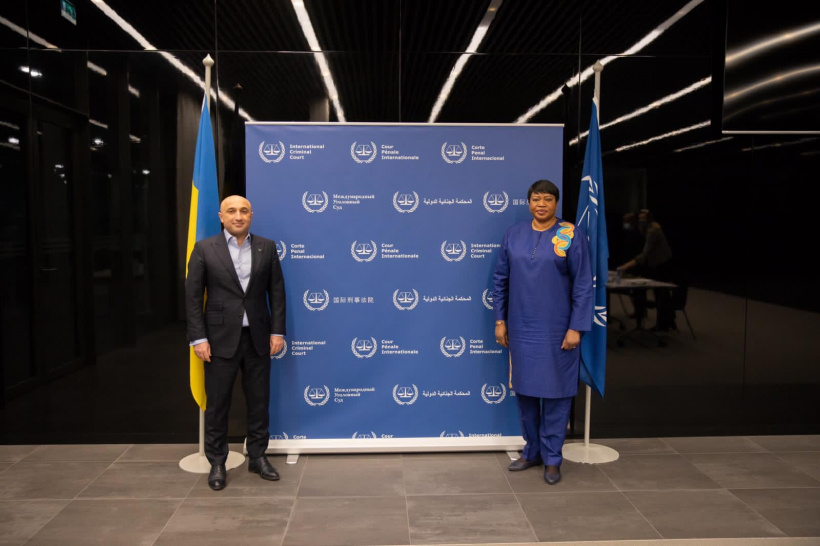
Another significant development is ‘On Amendments to Certain Legislative Acts on the Enforcement of International Criminal and Humanitarian Law’ (Bill 2689). As already mentioned, the complexity of Article 438 has slowed war crimes prosecutions. Work to simplify Ukraine’s legislative framework and bring it into step with contemporary ICL norms was initiated in 2016. The end product of this five-year endeavour was Bill 2689 which, inter alia, amends the UCC to: i) provide a comprehensive list and definitions of war crimes; ii) and CAH in line with the Rome Statute (RS) (CAH are absent from the UCC as is); iii) legislate for modes of command responsibility in line with the RS; iv) provide for universal jurisdiction. As such, as well as facilitating domestic prosecution of atrocities, Bill 2689 also serves to ease issues of complementarity and cooperation with the ICC and helps Ukraine fulfil its treaty and customary IHL obligations. Importantly, Article 17 of Bill 2689 provides for its retroactive application (this is in keeping with the principle legal certainty as war crimes and CAH are criminalised under CIL – see Article 7(1) European Convention on Human Rightsand Article 15 of the International Covenant on Civil and Political Rights, both of which Ukraine is a State Party to).
Credibility
Ukraine’s capacity to carry out war crimes and CAH prosecutions, however, should not be viewed through rose-tinted glasses. Bill 2689 passed its second (final) reading at the Verkhovna Rada (Ukraine’s parliament) on 20 May 2021 and was sent to the President’s Office on 6 June 2021. Under Article 94 of the Ukrainian Constitution, it should have been signed, and thus enacted, or returned for review with comments by Ukraine’s President Volodymyr Zelensky within 15 days (i.e., by 22 June 2021). Disappointingly, it is still awaiting his signature despite repeat calls by civil society groups, including the Coalition for the ICC, for Zelensky to enact it. That Bill 2689 has not been handled in accordance with Ukraine’s Constitution is troubling. According to political and legal commentators (writing prior to the Russian invasion) this reluctance stems from concerns among Ukraine’s political and military elite that it could be used to prosecute government forces (as well as anti-government forces) for ICL violations. Speaking to Radio Svoboda, Vladimir Gorbach, a political analyst at the Centre for Euro-Atlantic Cooperation commented: ‘in military circles there are fears that this law may be turned against the defenders of Ukraine, especially those volunteers of 2014-15.’ Notably, this chimes with analyses of Ukraine’s reticence to ratify the Rome Statute as based on a politicised (mis)understanding of the ICC and ICL. Another concerning development is the removal of Mamedov from his position at the War Crimes Unit in June 2021 – a move that Ukrainian human rights groups have criticised as detrimental and a politicised ousting. Meanwhile, Ukraine must work ensure that trial rights are fully upheld.
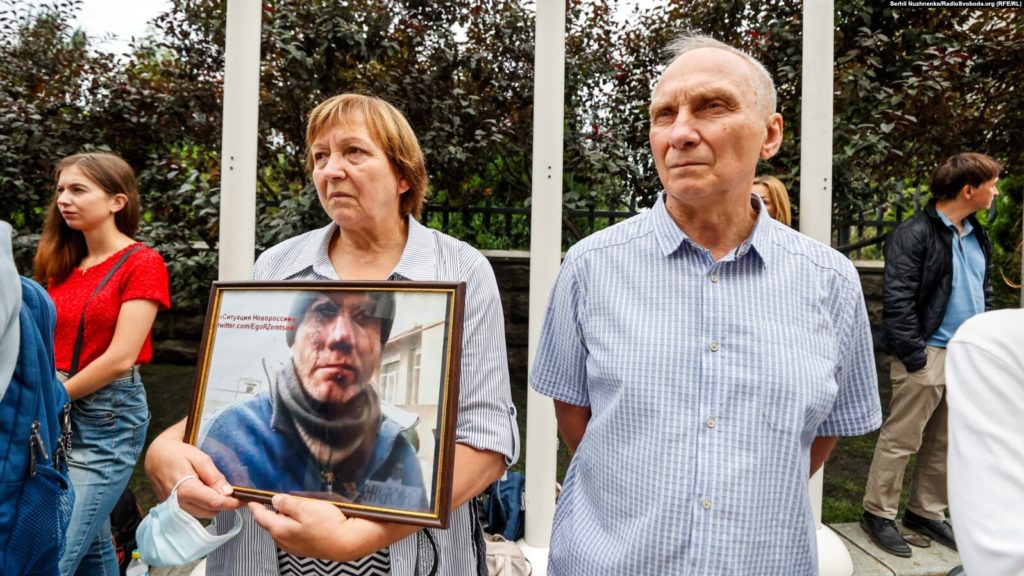
That said, while it may be a case of two steps forward one step back, Ukraine’s progress in prosecuting ICL violations over the last eight years, in highly challenging circumstances (namely the conflict in Donbas and occupation of Crimea), should not be overlooked. Ukraine has successfully prosecuted war crimes cases under its existing legislative framework. Bill 2689 has passed its most significant hurdle of receiving parliamentary approval. Article 17, which provides for the law’s retroactive application, means that it could be applied to the entirety of the Ukraine conflict as soon as Zelensky signs it. Moreover, despite the hesitation over Bill 2689, Ukraine has prosecuted pro-government forces for atrocities committed in the conflict. A landmark case (widely viewed as a litmus test in this regard) was the trial of 12 members of the notorious Tornado battalion. Despite demonstrations outside the courtroom and political pressure from right-wing lawmakers who claimed the charges were ‘fabricated’, the men were convicted in April 2017 of abuses, including illegal detention and sexual assault, committed while policing Pryvillia – a town near the frontline previously controlled by separatist forces.
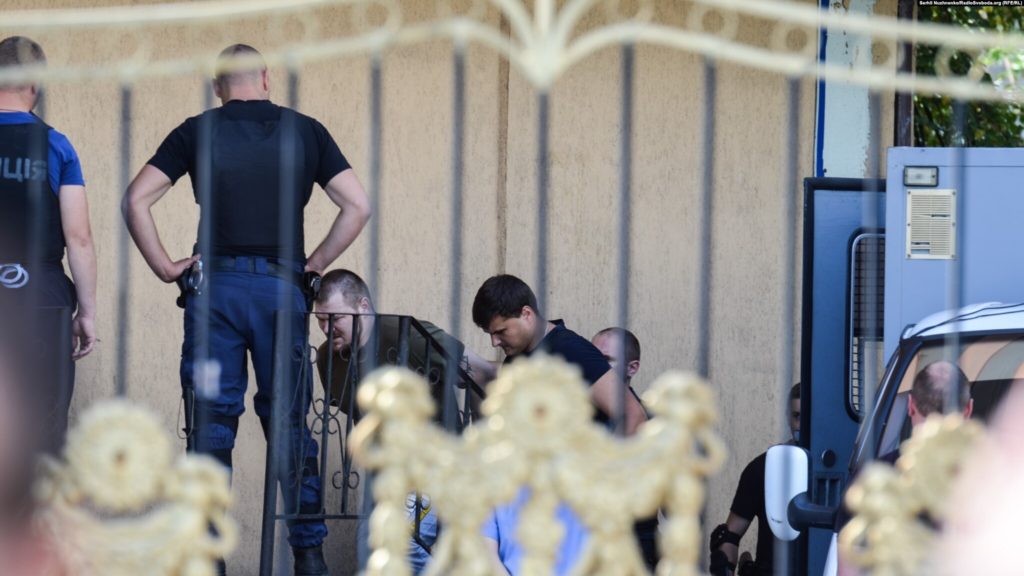
Another important consideration is that Ukraine does not have to go it alone. Following an unprecedented referral by 40 State Parties the ICC’s Prosecutor, Karim Kham, announced the official opening of an investigation into the situation in Ukraine on 2 March 2022. The ICC is the most appropriate forum for prosecuting officials that either enjoy immunity before Ukraine’s courts (i.e., sitting Heads of State or Foreign Ministers) or who are who are so high-profile that international scrutiny is desirable. However, the vast majority of ICL violations in Ukraine will not end up in The Hague. The Rome Statute’s (RS) gravity threshold (Articles 17(1)(d)) is high and must be satisfied for each case. Additionally, the OTP prosecutes selectively (normally with the goal of building up towards cases against prolific individuals). Moreover, the ICC is a Court of last-resort which prosecutes only when States are ‘unwilling or unable’ to do so (Article 17). The RS’s provisions on the principle of complementarity (Articles 1, 17, 53) go beyond simply ensuring non bis idem. The RS subordinates the Court to (properly carried out) domestic investigations and prosecutions and, moreover, encourages them. Article 93(10) provides: ‘the Court may, upon request, cooperate with and provide assistance to a State Party conducting an investigation into or trial in respect of conduct which constitutes a crime within the jurisdiction of the Court’. The opening of the ICC investigation therefore also provides an opportunity for the Court to bolster Ukraine’s capacity to prosecute ICL violations. Another avenue of support open to Ukraine is the structural investigation (Strukturermittlungsverfahren) opened by Germany, under the principle of universal jurisdiction. Structural investigations can be opened when there is evidence a crime has taken place, but perpetrators have not yet been identified. It allows for fast collection of evidence and has proven an effective tool for prosecuting and structuring war crimes cases. Such evidence could also be shared with Ukraine, which is a State Party to the European Convention on Mutual Assistance in Criminal Matters.
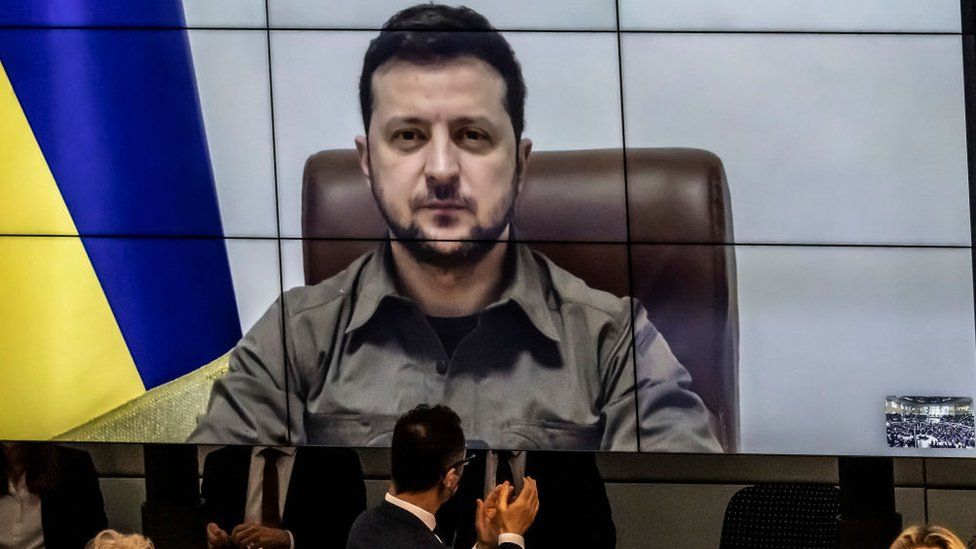
Conclusion
The war in Ukraine started eight years ago. During this time Ukraine, with international assistance, has made substantial progress in investigating and prosecuting ICL violations. Given the escalation in the conflict, Bill 2689 is more relevant than ever. Zelensky should enact it without further delay. Doing so will signal to the international community Ukraine’s commitment to fulfilling its obligations under IHL and upholding ICL even in its darkest hour. Ukraine will undoubtedly need international support in prosecuting atrocities, but it is available and should be both sought and provided. The benefits of conducting trials close to affected communities in conflict and post-conflict societies are well-documented in the transitional justice literature, both in regard societal healing and bolstering rule of law after seismic events. The outcome of the war in Ukraine is deeply uncertain. But nearly a month in, it is apparent the capabilities of Ukraine’s military were drastically underestimated by most. We should not make the same mistake with its legal system. Ukraine is a sovereign State and, as such, insofar as it is possible in accordance with the rule of law, it is desirable that the bulk of war crimes and CAH committed on its territory are prosecuted in its own courts.
Harriet Salem. Harriet is an LLM student in international law (specialisation in human rights law) at Maastricht University. She also holds an MA in International Politics with distinction from the University of Manchester. She has worked as a journalist for over ten years and reported extensively on the conflict in Ukraine.